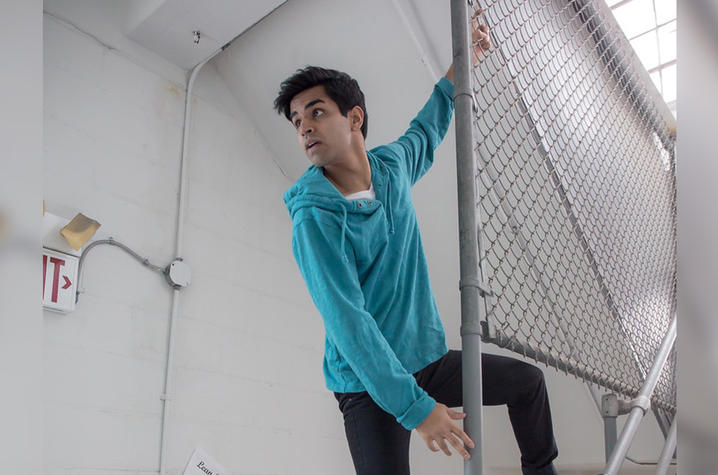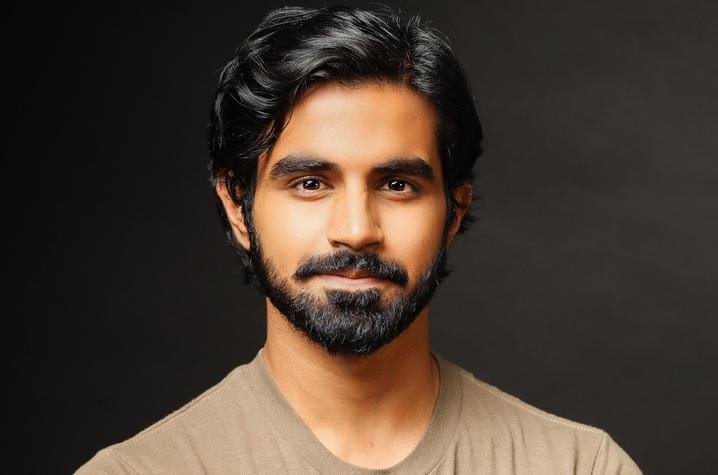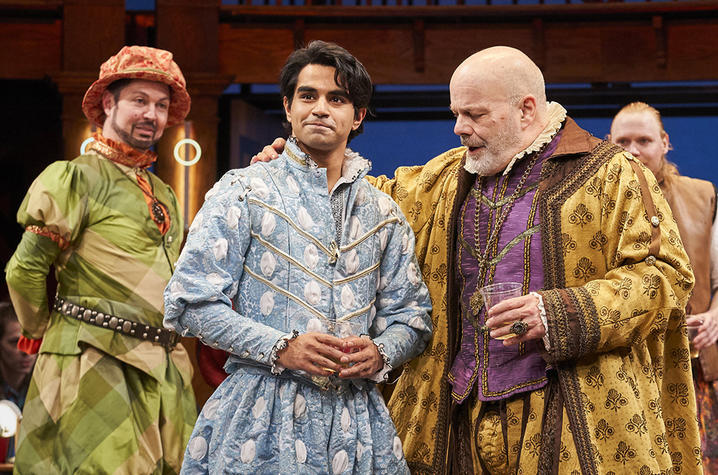UK alum from 'Life of Pi' reflects on lessons learned in theatre
LEXINGTON, Ky. (Aug. 31, 2023) — University of Kentucky Department of Theatre and Dance alumnus Taha Mandviwala recently made his Broadway debut in the play "Life of Pi. A native of London, Kentucky, Mandviwala launched his professional career with an acting internship at the Cincinnati Playhouse in the Park after graduating from UK with his bachelor's degree in theatre and a minor in psychology. Between his work as a parkour instructor, personal trainer, and navigating a rigorous Broadway schedule, UK College of Fine Arts got a chance to catch up with him to discuss his life post-graduation.
UK Fine Arts: What's the best advice you might give a student who's interested in pursuing a career in theatre (or in the arts in general)?
Mandviwala: Align your internal and external worlds. Internally, take ample time to reflect on why you’re choosing this path and match your passion for the arts with adaptive, real-world practicality. In other words, your artistry needs discipline to survive. If you’re in this for the long haul, regardless of your particular craft, it will take a strong yet flexible growth mindset to sustain yourself, financially as well as artistically. Hardships, obstacles, and challenges are an inevitable part of life (especially in this industry), but the journey to the other side can lead to a profound measure of fulfillment, joy, community and purpose. Lean into this as a metric of your own success, and don’t be afraid to make pivots when necessary.
Externally, know that you can’t do this alone. It’s the proliferation of your network and community that will cultivate growth and opportunity, and remaining open to new connections is paramount. Surrounding yourself with the right people will make or break your trajectory — find mentors that will guide you and give you honest feedback, collaborate with peers that challenge you and inspire you, and surround yourself with friends that ground you in love and compassion. Nurture all of your personal and professional relationships with kindness, intention and humility.
UK Fine Arts: After graduating from UK, you worked at the Cincinnati Playhouse in the Park. Can you tell us about that transition from educational theatre to professional theatre? How did your time at UK prepare you for that situation?
Mandviwala: For as long as I can remember, I’ve enjoyed being in school and having a structured learning environment. The implied accountability to show up and try your best went a long way for me, and I wanted to do a good job at whatever I decided to apply myself to. My time at UK originally began with a pre-medical track, but quickly became an incubator to experiment with the craft of acting. My theatre studies gave me a broad foray into acting technique, scene study, auditioning, performing, and an exposure to the village of talented people it takes to produce artistic works. A solid foundation needed to come before anything else, and I was lucky to be guided by wonderful professors who helped me build my confidence.
Moving from the tiny pond of educational theatre into the sea of professional work was facilitated by my acting internship at Cincinnati Playhouse in the Park, and I couldn’t be more grateful for that transition. The challenge was intense — my apprentice cohort and I worked across a variety of spaces: K-12 teaching artistry, the AEA regional theatre ecosystem, devised community immersive projects, workshops on the business of acting, and plenty of administrative tasks to round it all out. For me, it was the perfect crucible coming out of college to refine my skills and build my first professional network of friends and colleagues. Little did I know that Cincy Playhouse would go on to become my first artistic home, being the center from which my entire career spiderwebbed into existence. The whole staff holds a dear space in my heart.
UK Fine Arts: Your role in "Life of Pi" requires a lot of physical movement. What was the process like as a physical actor preparing for your role in the show and how did you train for the role?
Mandviwala: Training movement is a huge practical and philosophical force in my life. As an actor, our bodies are often the primary instrument of our storytelling, so it’s important to prioritize our physical and mental health. I’ve spent a huge amount of time over the years investing into my physical capabilities, as well as my practical understanding of the benefits of exercise/play through the lens of personal training and parkour. Speaking as a movement and health educator, it’s such a positive upward spiral for young actors (and people in general) to take initiative and learn a new physical skill or discipline.
For something like "Life of Pi," joint health was one of the biggest considerations, as my primary physical exertion came through the manipulation of large animal puppets (specifically the hyena and zebra “hearts”). My biggest training adjustments came through understanding the specific strength and dexterity requirements to operate certain puppets. In my warmup and independent training time, I prioritized stabilization-endurance training to make sure that my joints and muscles could endure awkward motions for extended periods of time without overcompensating in unhealthy ways. Proper recovery practices like foam rolling and stretching post-show were also a saving grace.
UK Fine Arts: With such a demanding Broadway show schedule, how do you find balance for yourself as an actor as well as an athlete?
Mandviwala: This one was tricky for me. The nature of New York is very go-go-go and very different from my small-town Kentucky energy — especially when joining the Pi company in the middle of their Broadway run. Things got busy, and there were many days where my 45-ish minute walking commute to/from the show sufficed as my daily movement quota. Anything else I could squeeze in (deep stretch sessions, foam rolling, sporadic pushups, squats, jogs, etc) was a victory. Once my show schedule became more regular, my training time began to balance accordingly. Something I often say to my personal training clients is to have grace with whatever chapter of life you’re in. Life can get busy, and the key is to celebrate and build upon whatever you can do and not punish yourself for what you can’t.
UK Fine Arts: What drove you to pursue a degree in theatre at the University of Kentucky, and what are some standout moments of your educational experience with the Department of Theatre and Dance?
Mandviwala: It was definitely a slow burn, but in short, I met the right people at the right time and my life path changed. It started when I met one of my lifelong best friends, Hunter Henrickson, who is an incredible performer down to the marrow of his bones. Going to his performances in high school/college began my exposure to theatre in earnest and piqued my curiosity to take a few classes myself. The baton then passed to Dr. Christina Ritter, who taught my first Intro to Theatre class freshman year of undergrad. She completely captured my attention with her deep knowledge and love for the art form. Andrew Dylan Ray (known by many as A-Ray) followed suit as one of my biggest mentors and advocates, introducing me to the SAFD (Society of American Fight Directors) and the incredible physical storytelling application of stage combat, which led to being cast in my first college show.
As time went on, I continued to grow as an actor alongside my classmates and friends. The faculty at UK Department of Theatre and Dance began to nudge me into a new reality where I could, if I stayed the course, have a budding career as an actor. I remember it being a deeply validating yet equally terrifying prospect. It meant pivoting from everything I had been working toward for med school for a calling that was, by most rational accounts, incredibly uncertain. I wish I could tell you a particular “lightning bolt” moment that helped me come to the decision that I made, but that’s not how it happened. It was a slow turning and gradual unveiling of a side of myself that demanded to be known and heard, fraught with choruses of self-doubt to “take the more practical option”. All these years later, I’m so deeply grateful to have made the choice to bet on myself, and for the people — past and present — that have helped me along this path of movement, people and the stories that bind us together.
UK Fine Arts: Was there anything unexpected about your experience joining a Broadway cast that you'd like to share?
Mandviwala: Understudy and swing life is fast-paced and relentless, but I was fortunate to have an incredible team supporting me and helping me seamlessly transition into the company. There’s also something insanely cathartic about being onstage in a kurta and ad-libbing in Gujarati or bantering in Urdu (two of my native languages growing up as a Pakistani-American) with a handful of my fellow South Asian cast buddies. I’ve never had a moment like that on stage before. The moments themselves were quick and often unnoticed, but it brought me an immense joy and pride to see a tiny part of my own cultural experience brought to life on this stage.
"Life of Pi" had 18 Broadway company debuts and the most Asian Americans in a play on Broadway this season. To be a small part of that family and history is an incredible honor. I was also deeply fortunate to have worked alongside the most talented puppeteers and physical artists — true masters of their craft and a treasure trove of talent, grace and camaraderie. This cast and creative team was a celebration of everything I had ever dreamt of experiencing in a play, and was a lightning in a bottle experience that, I hope, has a bright and fruitful future ahead.
For more information on Taha, check out his Instagram @manlykoala or visit his website at tahamandviwala.com.
As the state’s flagship, land-grant institution, the University of Kentucky exists to advance the Commonwealth. We do that by preparing the next generation of leaders — placing students at the heart of everything we do — and transforming the lives of Kentuckians through education, research and creative work, service and health care. We pride ourselves on being a catalyst for breakthroughs and a force for healing, a place where ingenuity unfolds. It's all made possible by our people — visionaries, disruptors and pioneers — who make up 200 academic programs, a $476.5 million research and development enterprise and a world-class medical center, all on one campus.







